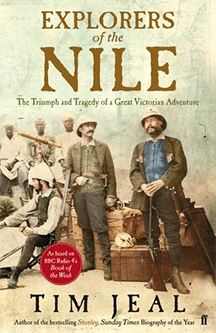By Lewis Fried
For the Western mind, certainly of the Victorian period, the rivers of Africa—the Blue Nile, the White Nile, and the Congo—occupy a special place. For all purposes, these rivers are enfolded by imagination. They testified to unknown worlds, and the allure of adventure, whether it be for the sake of discovery, missionizing, ending the slave trade, for exploitation, or for a combination of all of these. As Tim Jeal points out, for Africans, a perplexity they sometimes expressed was why would anyone hazard so much for a mere body of water?
This fascinating book—and it will quickly hold your attention—deals with the White Nile and those Victorian explorers who sought its origins. The book is also an homage to the human desire to know; to push beyond limits; to impose one’s will on nature, and people, and to possess. Among the compelling strengths of the book is its dedication to the individual, and the explosive consequences of discovery. As a result, the book is a combination of biography, geography, and political commentary. It should come as no surprise that as the book unfolds, names, places and politics can come as quickly as the lay of the land becomes charted. But what history is simple? Or expressible as a straight line?
Jeal gives us people who were contentious, sometimes jealous of other explorers to the point of absurdity, certainly all “characters,” but nonetheless, bold to the point at which we can question whether they were brave because they had no imagination of death, or intrepid because they faced mortality every inch and minute of their exploration. Malaria, dysentery, fevers, wounds; trips stalled for months, or hacked out of jungle, and swamp; hunger that cut into the flesh; porters and guides who ran the spectrum from loyal to treacherous; rain and heat that sank into the bone—one either had to be driven by motivations so urgent and compelling that they transcended any grasp of normalcy, or one had to be beyond normal comprehension.
Yet comprehended these explorers were. In their own time, some of them presented themselves in self-serving letters and speeches, books, and claims. Few were modest. In our own day, commentators have become more comfortable stripping away the explorers’ egoistic stains. Jeal is at home looking at the very large picture these overlapping charges and counter-charges composed, bringing some figures “down to size” while elevating others who were somewhat reticent about their accomplishments.
Of course, Jeal’s canvas is large. It is populated—and this is not an inclusive list—by David Livingstone, John Rowlands who invented himself as Henry Morton Stanley, Richard Burton, John Speke, John Petherick, Samuel Baker and his consort-become-wife Florence von Sass; the guides and porters enabling the expeditions; slave traders, for example, Tippu Tip and Musa Mzuri; and African tribal chiefs, kings, and modern politicians.
Jeal is brilliant handling these individuals; he is just as illuminating when he traces the consequences of discovery. The imperative to “civilize” Africans by bringing them the advantages of Western “progress,” while destroying the slave trade was a mixture of naïveté and idealism. Exploration also began to be stained by imperialism and dominance, choking the development—and this possibility we can only conjecture about—of an uncoerced African politics. As European powers saw the advantages of colonization, so the European imagination about the Nile became transformed into the politics of controlling what territory was at hand. The results, as Jeal points out, piled disaster upon catastrophe: civil wars, tribal displacements, corruption, imposed boundaries, and the collapse of cultures and beliefs. The press, indeed, does focus on disasters.
However, can the Victorian explorers be charged with responsibility for this? Did the great explorations have to end in this fashion? Jeal has little patience for those who would conflate the hopes of his subjects with the failures of African and European governments. “The courage and vision of this small group,” he writes in his concluding paragraph, “is not less praiseworthy because the next century did not bear out their hopes for the future of the regions they had revealed with so much difficulty and hardship.”
My only annoyance is that Yale University Press skimped on the maps. Yes, they are there, in black and white, but with various explorations badly presented—all in need of more detail and clarity. The illustrations and plates are fine. Maps aside, this book rewards the reader with a spellbinding trip across history, astonishing personalities, and that grand river, the White Nile.
Lewis Fried (ΦBK, Queen’s College, CUNY, 1964) is Professor of English Emeritus at Kent State University and a resident member of the Nu of Ohio chapter of Phi Beta Kappa.




